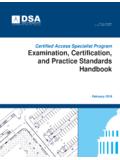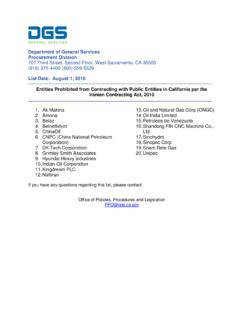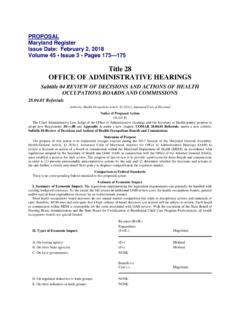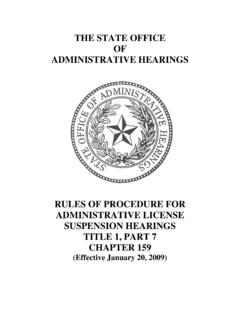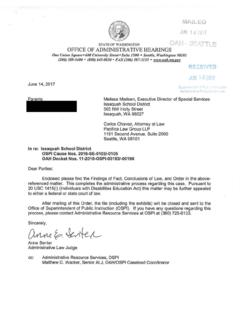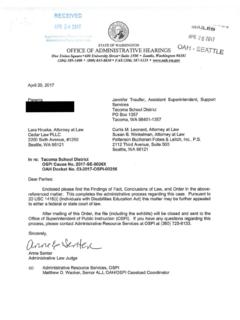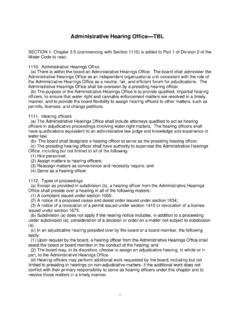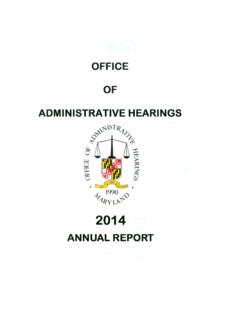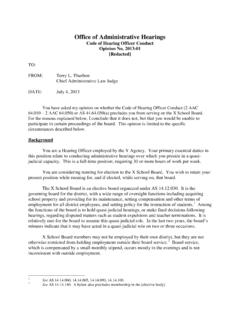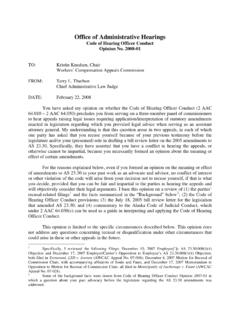Transcription of SPECIAL EDUCATION HANDBOOK PROVIDED BY THE OFFICE …
1 DEPARTMENT OF GENERAL SERVICES OFFICE OF administrative HEARINGS SPECIAL EDUCATION HANDBOOK PROVIDED BY THE OFFICE OF administrative HEARINGS 2018 INTRODUCTION .. 7 The OFFICE of administrative Hearings .. 8 OAH Contact Information .. 8 The HANDBOOK is Available in Other Languages and Formats .. 9 PART 1: BRIEF SUMMARY OF EDUCATIONAL RIGHTS .. 11 The Rights of Children with Disabilities .. 11 Determining Eligibility for SPECIAL EDUCATION .. 12 The Individualized EDUCATION Program .. 13 The IEP 13 The IEP Team Meeting .. 13 What the IEP Document Must Include .. 14 PART 2: DUE PROCESS .. 15 PART 3: HOW DUE PROCESS BEGINS .. 16 Request for Mediation and Due Process hearing (Chart 1) .. 16 Request for Due Process hearing Where OAH Decides at Lease Some of Issues Are Expedited (Chart 2) ..17 Request for Mediation Only (Chart 3).
2 18 Request for Due Process hearing (Chart 4) .. 18 Filing and Serving the Complaint and Other Documents .. 19 Proof of Service .. 19 Filing the Documents .. 20 Using the Secure e-File Transfer System .. 20 How to Register .. 20 How to Login to SFT .. 21 How to File a Complaint or Other Document .. 21 How to View Documents in SFT .. 22 Troubleshooting .. 23 Canceling Your 23 If Parents Do Not Write and/or Do Not Speak English .. 23 Translation of Document into Other Languages .. 23 Requesting Interpreters .. 23 Mediation and hearing Locations .. 24 Accessibility .. 24 Attorneys .. 24 3 PART 4: THE FOUR TYPES OF DUE PROCESS PROCEEDINGS .. 25 Mediation Only .. 25 Mediation and hearing .. 25 hearing 26 Expedited Hearings .. 26 PART 5: THE COMPLAINT/REQUEST FOR DUE PROCESS hearing .. 27 Who Can file a Complaint .. 27 Students.
3 27 School Districts or Other Educational Agencies .. 27 How to Write a 27 Getting Help with OAH Forms .. 28 What to do After the Complaint is Prepared .. 29 How to File a Complaint Using 29 How to Prepare a Form Complaint for SFT From the Website .. 30 How to Prepare a Typed or Handwritten Form Complaint for 30 How to Prepare for SFT a Complaint that is Not an OAH Form .. 31 Responding to a Complaint .. 31 PART 6: RESOLUTION SESSIONS .. 31 What is a Resolution Session .. 31 If the District Does Not Hold a Resolution Session .. 32 If Parents Do Not Go to the Resolution Session .. 32 Timelines for Resolution Session .. 32 Resolution Session Timing in Expedited Cases .. 32 If the District does not Hold a Resolution Session .. 32 If Parents do not go to the Resolution Session .. 32 When the Resolution Session May be Cancelled .. 33 People Who Have To Be at the Resolution Session.
4 33 Agreement at Resolution Session .. 33 Agreement .. 34 If There is no Agreement after a Resolution Session .. 34 The Difference between a Resolution Session and Mediation .. 34 PART 7: MEDIATION .. 35 Mediation is Voluntary .. 35 Mediation is Confidential .. 36 Requesting and Scheduling Mediations .. 36 4 Mediation Only and Expedited Matters .. 36 Request for Due Process and Mediation .. 36 Parties are Responsible for Cancelling a Mediation Date.. 37 Requesting a Continuance (Rescheduling) the hearing and Prehearing Conference .. 37 The Mediation Process .. 38 The Mediators .. 38 The Mediation Meeting .. 38 The Settlement 39 When Approval by the School Board is Necessary .. 40 If There is No Agreement .. 40 OAH Mediation Forms .. 40 Enforcement of the Settlement Agreement .. 41 PART 8: SCHEDULING ORDER .. 41 PART 9: MOTIONS .. 42 How to Prepare a Motion.
5 42 How to Respond to a Motion .. 43 Some Common Types of Motions .. 43 Notice of Insufficiency .. 43 Motions/Requests for Continuance .. 44 Motions for Stay Put .. 44 Motions to Dismiss .. 44 Motions to Amend Due Process 45 Motion to Add a Party to the Case .. 45 Motion to Consolidate Two or More Cases .. 45 Motion to Challenge the Judge Assigned to the hearing .. 45 How to Present Evidence to Support or Respond to a Motion .. 46 Declarations Stating Facts .. 46 Declarations Allowing Documents to be Submitted as Evidence .. 47 PART 10: STUDENT RECORDS .. 47 PART 11: PREHEARING CONFERENCE .. 48 Prehearing Conferences Are Conducted by Conference 49 The Purpose of the Prehearing Conference .. 49 How to Prepare for the Prehearing Conference .. 49 Will you Need a Subpoena to Have a Witness Attend the hearing ? .. 50 The Parties Prehearing Conference Statements .. 50 5 The Judge Will Prepare a Prehearing Conference Order.
6 51 PART 12: DUE PROCESS hearing .. 51 The Due Process hearing Location, the hearing Process and Judge s Role .. 52 The Location of hearing .. 52 Issues and Burden of Proof .. 52 The Judge Conducts the hearing .. 52 How to Prepare for hearing .. 53 To Prepare for hearing , Follow these Steps .. 53 New Attorney If You Are Hiring an Attorney, Try to Do So As Early As Possible .. 57 What to Expect at 57 Self Help Tips for Parents .. 60 What to Bring to the hearing .. 60 What to do if you Are Late to the hearing .. 60 Sample Questions How to Question Witnesses .. 61 How to Question Expert Witnesses .. 62 Parents Testimony .. 62 How to Put Exhibits into Evidence .. 63 How to Present an Audio Recording at a hearing .. 63 What Happens at the End of Each 64 What to do on the Last Day of the hearing .. 64 Evidence Reconciliation .. 64 Closing 65 PART 13: DECISION .. 66 PART 14: RIGHT TO APPEAL DECISION.
7 67 PART 15: ADDITIONAL RESOURCES .. 67 Definition of Terms and Frequently Used Acronyms .. 67 The Individuals with Disabilities EDUCATION Act (IDEA) .. 67 List of Acronyms .. 67 Self Help Guide to Laws That Apply to SPECIAL EDUCATION Hearings .. 77 FORMS AND COMMON 80 6 INTRODUCTION All children with disabilities have a right to a free appropriate public EDUCATION . This HANDBOOK uses the acronym "FAPE" to mean a free appropriate public EDUCATION . The federal law that gives these rights is the Individuals with Disabilities EDUCATION Act. The federal law is also known as the IDEA. The California version of the law is in California's EDUCATION Code. This HANDBOOK has two goals. The first goal is to help students and their families understand their rights under the law. The second goal is to help families use what is called due process if they believe their child is not receiving a FAPE.
8 This HANDBOOK describes what due process is and how it works in California. The IDEA intended parents to be able to use due process without an attorney. However, parents have a right to an attorney, at their own expense, and some, but not all, parents choose to have an attorney represent them. Parents also have the right to be accompanied by persons with specialized knowledge, although non-attorneys cannot represent Parents in mediation or in hearings. The HANDBOOK is meant to help parents understand due process whether or not they have an attorney or other help. The OFFICE of administrative Hearings cannot give legal advice to anyone, but it is easier to be a part of mediation and a due process hearing if you understand the process. The HANDBOOK will refer to the SPECIAL EDUCATION Division of the OFFICE of administrative Hearings as "OAH." The HANDBOOK explains how due process works.
9 The Parts of the HANDBOOK walk through each step of the process and explain how to participate in each step. It is not necessary to read the entire HANDBOOK to get started. However, reading the HANDBOOK from the beginning may give parents a general understanding of how things work. Due process begins when someone sends a request for due process to OAH. This request is often called a complaint . OAH has a form to use to request due process and other forms to use during the proceedings. The forms have instructions and the HANDBOOK explains what forms are available and how to use them. Forms are available through the OAH website or by asking for them from the OAH OFFICE in Sacramento. There are many different people and agencies involved in due process proceedings. The HANDBOOK will use the term "parents" to mean parents, legal guardians, or any person or entity who is legally responsible for protecting a student's educational rights.
10 Students that are 18 or older have the same rights as "parents" as that term is used in this HANDBOOK . The HANDBOOK will use the term "district" to refer to all educational agencies involved in making educational decisions for a student. These agencies include: School districts; SPECIAL EDUCATION local plan areas (commonly called SELPA s); Charter schools; and Other state agencies that provide services to children with disabilities. Lastly, the term party means a parent, person, district or other educational agency involved in a due process proceeding. 7 The OFFICE of administrative Hearings SPECIAL EDUCATION Division OAH is a neutral state agency that helps solve disagreements between individuals and government agencies. The SPECIAL EDUCATION Division handles mediations, prehearing conferences and due process hearings. OAH provides mediators and administrative law judges who help parents and districts work out their differences in mediation or as the result of a hearing .

